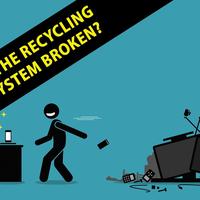Is the recycling system broken? - 6 Minute English - YouTube
Hello. This is 6 Minute English from
BBC Learning English. I'm Neil.
And I'm Georgina.
Sorry I was late today, Georgina.
I'd forgotten to do the recycling
bins out before the rubbish
collection this morning. I seem to have
more and more plastic packaging
each week! Actually,
that's the topic of our programme.
With more and more household waste
being either incinerated
- that's burned - or being buried
underground, we'll be asking - is
the recycling system
broken?
China used to accept 55% of the world's
plastic and paper scrap - another
word for unwanted
waste - or in other words, rubbish.
That included waste sent over from
Britain. But in 2018
it stopped taking any more.
Other countries like Indonesia and
Vietnam took over China's waste
processing role. But
they too are now sending much
of the scrap back, arguing it is
contaminated and it is
harming their own environments.
This has created major problems for
countries in the West who traditionally
relied on others
to process their recycling waste.
And the problem isn't going away.
In fact we are creating more
household waste than
ever. So here's my quiz question.
On average, how many kilograms of
household waste were
generated per person in the UK
last year? Was it:
a) 280 kg, b) 480 kg or c) 680 kg?
That sounds like a lot of waste!
I'll say a) 280 kg.
OK. We'll find out later if you were right.
Although nowadays people
are recycling more,
the use of plastic isn't decreasing at the
same rate. The BBC
World Service's programme
The Inquiry spoke to Roland Geyer,
a professor at the University of
California about the
current situation.
There's been a real raise
in consciousness which is fantastic
and I'm really glad that
now it seems the public at large is really
interested in this issue and appalled and
wants to do something about it, wants
to change it. But at the same time
I don't see yet any
real action that would make things better
because while all of this is happening the
virgin plastic industry is actually
increasing its production capacity.
Workers who process recycling are often
exposed to dangerous waste materials
which can harm
them. Professor Geyer says there
has been a raise in consciousness
about this problem
- meaning that people are being
told about an unfair situation with
the aim of asking
them to help change it. Now, professor
Geyer is an American and
he uses 'raise' as a noun.
The main problem comes from
virgin plastic - original, unused plastic
containers. These
are made directly from fossil fuels like
crude oil or natural gas - major sources
of carbon
dioxide and climate change.
But consciousness raising of this issue
is having an impact. The public
at large - meaning
most people in the world, rather than just
some of them - are concerned
about the increase
in plastic waste and want
to do something to help.
However, it's not always easy to know
what the best way to help is.
Another expert, Professor Monic Sun,
believes that focusing only
on recycling may not be
the best idea. She conducted
psychological experiments to find out
more about peoples'
attitudes to recycling...
..and surprisingly found that if people
know recycling is an option they
tend to use more
resources. They reduce any guilty feelings
by telling themselves that the material will
be recycled anyway.
We have the slogan of 'Reduce, Reuse
and Recycle' and the priority should
be exactly that - reduce
and reuse is better than recycling. And the
cost of recycling is often not emphasised
enough. People perceive recycling
to be great but there's actually
significant labour and
material costs associated with recycling.
Professor Sun mentions 'Reduce, Reuse
and Recycle' as a useful
slogan - a short, easily
remembered phrase, often used to
promote an idea, in this case
that we should all do what
we can to protect the environment.
But while protecting the planet is
a common goal, recycling in itself may
not be so important.
It's better to reduce and reuse
than recycle, so these two objectives
should be emphasised
- highlighted as being
especially important.
Do you remember my quiz question?
I asked you how many kilograms
of waste the average
British person generated last year.
I reckoned it was a) 280 kg.
That would be bad enough, but
the real answer is b) 480 kg.
Multiply that by the UK population
of 66 million and you start to see
the size of the problem!
Today we've been talking about the
problems associated with
recycling scrap - another
word for rubbish.
Western countries used to send their
rubbish to China for recycling
but this caused issues
for the local environment. Some groups
raised consciousness about
the problem - made people
aware of the situation to encourage
them to help change it.
The public at large - most people in the
world - are now aware of the need
to 'Reduce, Reuse
and Recycle', the slogan - or short,
memorable phrase - used by
environmentalists to spread
their message.
A related problem is the increase
of virgin plastic - original, unused
plastic made from
fossil fuels. Recycling is unable
to keep pace with virgin plastic
production, so instead
reducing and reusing plastic should be
emphasised - highlighted as being
especially important.
And that's all from us. Bye for now.
Bye.

